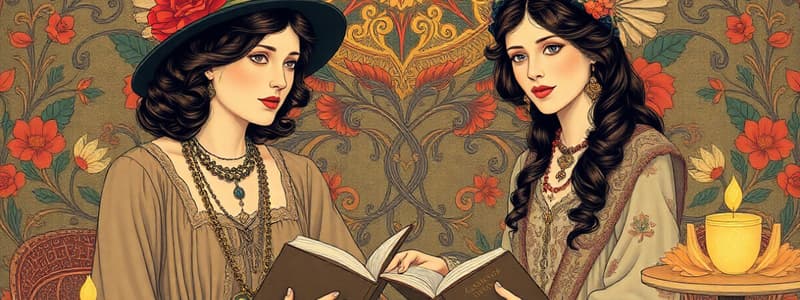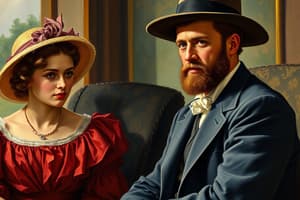Podcast
Questions and Answers
Who was the first American to win the Nobel Prize in Literature?
Who was the first American to win the Nobel Prize in Literature?
Sinclair Lewis
What made Sinclair Lewis's writing significant?
What made Sinclair Lewis's writing significant?
He was a critic of 1920s America's conformity and materialism.
Who was considered America's most beloved hero during the 1920s?
Who was considered America's most beloved hero during the 1920s?
Charles Lindbergh
What was Charles Lindbergh famous for accomplishing?
What was Charles Lindbergh famous for accomplishing?
What is the definition of fundamentalism?
What is the definition of fundamentalism?
What were the main themes of Langston Hughes's poetry?
What were the main themes of Langston Hughes's poetry?
What was the perspective Ezra Pound and T. S. Eliot presented in their work?
What was the perspective Ezra Pound and T. S. Eliot presented in their work?
Which of the following writers are considered part of the Lost Generation?
Which of the following writers are considered part of the Lost Generation?
What was Ernest Hemingway's stance on the glorification of war?
What was Ernest Hemingway's stance on the glorification of war?
What did F. Scott Fitzgerald's writing reveal about the 1920s?
What did F. Scott Fitzgerald's writing reveal about the 1920s?
Where did jazz music originate?
Where did jazz music originate?
Where did jazz music spread during the 1920s?
Where did jazz music spread during the 1920s?
Who is considered the most important musician in the history of jazz?
Who is considered the most important musician in the history of jazz?
What were speakeasies?
What were speakeasies?
What were flappers?
What were flappers?
What was The Great Migration?
What was The Great Migration?
What was George Gershwin's musical achievement?
What was George Gershwin's musical achievement?
What were Louis Armstrong's contributions to jazz?
What were Louis Armstrong's contributions to jazz?
Where did Al Capone run his bootlegging operation?
Where did Al Capone run his bootlegging operation?
What charges was Al Capone eventually arrested on?
What charges was Al Capone eventually arrested on?
What was the trial of John T. Scopes about?
What was the trial of John T. Scopes about?
Who defended John T. Scopes in his trial?
Who defended John T. Scopes in his trial?
What was the significance of the Scopes Trial?
What was the significance of the Scopes Trial?
Why was Prohibition difficult to enforce?
Why was Prohibition difficult to enforce?
Who typically supported Prohibition?
Who typically supported Prohibition?
What name did F. Scott Fitzgerald give to the 1920s?
What name did F. Scott Fitzgerald give to the 1920s?
What is the NAACP and what did it work to accomplish?
What is the NAACP and what did it work to accomplish?
Who was a founding member of the NAACP?
Who was a founding member of the NAACP?
What did the NAACP work to accomplish?
What did the NAACP work to accomplish?
Which amendment initiated Prohibition?
Which amendment initiated Prohibition?
Which amendment repealed Prohibition?
Which amendment repealed Prohibition?
What was the Harlem Renaissance?
What was the Harlem Renaissance?
Where is Harlem located?
Where is Harlem located?
What was the Kellogg-Briand Pact?
What was the Kellogg-Briand Pact?
What is the definition of a bigot?
What is the definition of a bigot?
Who were Sacco and Vanzetti?
Who were Sacco and Vanzetti?
What was the Teapot Dome Scandal?
What was the Teapot Dome Scandal?
What is urban sprawl?
What is urban sprawl?
What was the Fordney-McCumber Tariff?
What was the Fordney-McCumber Tariff?
What did employers accuse strikers of being?
What did employers accuse strikers of being?
Why did the KKK reemerge in the 1920's?
Why did the KKK reemerge in the 1920's?
What policy did the US follow after WWI?
What policy did the US follow after WWI?
What is the Quota System?
What is the Quota System?
What is Communism?
What is Communism?
What was the Red Scare?
What was the Red Scare?
What is an anarchist?
What is an anarchist?
What is an installment plan?
What is an installment plan?
Which president died in 1923?
Which president died in 1923?
Flashcards
Sinclair Lewis
Sinclair Lewis
First American to win the Nobel Prize in Literature. Critic of 1920s America's conformity and materialism.
Charles Lindbergh
Charles Lindbergh
America's most beloved hero; small-town pilot and aviation pioneer.
First nonstop Atlantic flight
First nonstop Atlantic flight
Charles Lindbergh was the first to fly nonstop across the Atlantic Ocean.
Fundamentalism
Fundamentalism
Signup and view all the flashcards
Langston Hughes
Langston Hughes
Signup and view all the flashcards
Lost Generation Writers
Lost Generation Writers
Signup and view all the flashcards
Ernest Hemingway
Ernest Hemingway
Signup and view all the flashcards
F. Scott Fitzgerald
F. Scott Fitzgerald
Signup and view all the flashcards
Jazz music origins
Jazz music origins
Signup and view all the flashcards
Louis Armstrong
Louis Armstrong
Signup and view all the flashcards
Speakeasy
Speakeasy
Signup and view all the flashcards
Flappers
Flappers
Signup and view all the flashcards
Great Migration
Great Migration
Signup and view all the flashcards
George Gershwin
George Gershwin
Signup and view all the flashcards
Al Capone
Al Capone
Signup and view all the flashcards
Prohibition laws
Prohibition laws
Signup and view all the flashcards
Scopes Trial
Scopes Trial
Signup and view all the flashcards
NAACP
NAACP
Signup and view all the flashcards
Communism
Communism
Signup and view all the flashcards
Red Scare
Red Scare
Signup and view all the flashcards
Anarchist
Anarchist
Signup and view all the flashcards
Installment plan
Installment plan
Signup and view all the flashcards
Kellogg-Briand Pact
Kellogg-Briand Pact
Signup and view all the flashcards
Teapot Dome Scandal
Teapot Dome Scandal
Signup and view all the flashcards
Urban sprawl
Urban sprawl
Signup and view all the flashcards
Fordney-McCumber Tariff
Fordney-McCumber Tariff
Signup and view all the flashcards
Quota System (Immigration)
Quota System (Immigration)
Signup and view all the flashcards
Bigot
Bigot
Signup and view all the flashcards
Study Notes
Key Figures and Events of the 1920s
- Sinclair Lewis: First American to win a Nobel Prize in Literature, critiqued 1920s conformity and materialism.
- Charles Lindbergh: First person to fly nonstop across the Atlantic Ocean, becoming a beloved American hero.
- Lost Generation Writers: Group including Ernest Hemingway, F. Scott Fitzgerald, and Sinclair Lewis who wrote about the horrors of World War I and the negative aspects of consumerism.
- Ernest Hemingway: Criticized the glorification of war.
- F. Scott Fitzgerald: Portrayed the negative side of 1920s gaiety, depicting privileged yet troubled lives.
- Langston Hughes: Celebrated African American culture in his poetry, depicting the lives of working-class African Americans.
- Ezra Pound and T. S. Eliot: Presented a bleak view of 1920s society stripped of humanity.
- Louis Armstrong: A highly influential jazz musician, considered a founding figure and important figure in the history of jazz, known for his rhythm and improvisation skills, spreading jazz to the North.
- Al Capone: Famous bootlegger operating in Chicago. Arrested for income-tax evasion.
- George Gershwin: Combined traditional elements with American jazz, creating a unique American sound.
- John T. Scopes: Teacher who was tried for teaching evolution, challenged the role of science and religion in schools.
- Clarence Darrow: Attorney who defended Scopes during the trial.
- W. E. B. Du Bois: Founding member of the NAACP, leading the fight for civil rights.
- NAACP (National Association for the Advancement of Colored People): Advocated for African Americans' civil rights and protested racial violence.
Cultural and Social Trends
- Jazz Music: Originated in New Orleans, spread to the North, and became a defining musical style of the 1920s.
- Flappers: Young women who challenged societal norms with their radical fashion and behavior.
- The Great Migration: Mass movement of African Americans from the South to Northern cities seeking jobs.
- Speakeasies: Illegal underground saloons and nightclubs operating during Prohibition.
- Prohibition: The 18th Amendment (1920) banned the production and sale of alcohol; it was notoriously difficult to enforce. The 21st Amendment (1933) repealed Prohibition.
- Harlem Renaissance: A cultural movement in Harlem, New York, that celebrated African American arts and culture.
- The Kellogg-Briand Pact: An international agreement signed in 1928 aiming to prevent war.
- Urban Sprawl: The growth of cities outwards due to expanded automobile use. Workers could live further from their jobs.
- Red Scare: Fear of communism's spread in the United States. Fear of anarchists and communists trying to overthrow the American way of life.
Political and Economic Events
- Quota System (Immigration): Limited immigration based on nationality. Led to discriminatory practices towards certain immigrant groups.
- Fundamentalism: A Protestant movement interpreting the Bible literally.
- Teapot Dome Scandal: Corruption in the Harding administration involving the leasing of government oil reserves.
- Fordney-McCumber Tariff: A high tariff that protected American businesses but hindered foreign trade, potentially contributing to the Great Depression (1922-1930).
- Sacco and Vanzetti: Italian-American anarchists who were convicted of murder (1927) amid controversy and allegations of bias.
- Warren G. Harding: President who died in 1923.
Other Key Details
- Employers' Accusations: During labor strikes, employers accused strikers of being communists.
- KKK Reemergence: The resurgence of the Ku Klux Klan was fueled by fear of immigrants, communists and associated bigotry during the Red Scare and by those with anti-immigrant biases.
- US Policy Post-WWI: The US followed a policy of Isolationism following World War I.
- Installment Plans: A common payment plan during the 1920s to encourage consumerism and purchasing.
Studying That Suits You
Use AI to generate personalized quizzes and flashcards to suit your learning preferences.




